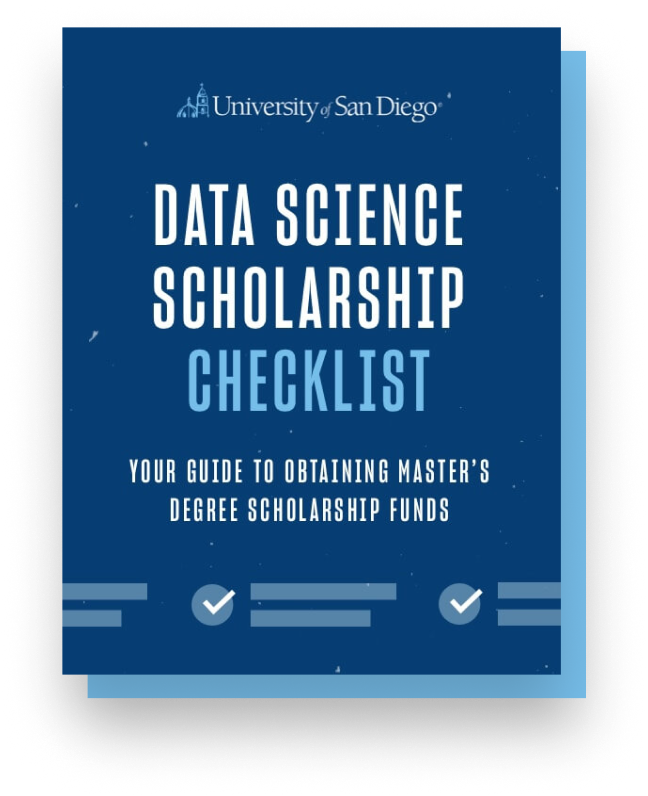Are you thinking about a career in data science? You’re not alone — data science continues to be one of the fastest-growing and highest-paying fields in today’s job market. According to the U.S. Bureau of Labor Statistics, data scientists earn a median salary of more than $100,000, with job opportunities projected to grow substantially from 2023 to 2033.
To meet this demand, many universities now offer specialized programs for aspiring data science majors. Choosing the best degree for data science can help you stand out and prepare for a wide range of roles in this dynamic and evolving field.
Keep reading to explore which undergraduate and graduate degrees offer the strongest foundation for a successful data science career.
8 Popular Careers in Data Science
Though data scientist is a popular career choice, there are many other exciting positions in the field of data science.
- Data Scientist — A person in this position uses data expertise to collect and review data to understand a business problem or challenge. They’ll use that data to prepare insights by conducting exploratory analysis and engaging in data modeling and visualization. This role often commands one of the highest salaries in the field.
- Data Analyst — Data analysts translate numbers and data into words and graphic visualizations to help organizations and companies understand how to make more informed business decisions — everything from how to price and market new products to how to attract new customers, reduce expenses and improve outcomes. While this role focuses more on interpreting existing data than building models, the distinction between data analysts and data scientists often depends on the tools used and the complexity of the analysis.
- Database Developer — A central role of the database developer is to help organizations improve the way they utilize data to enhance operational efficiency and uncover valuable business insights and potential opportunities. This career path frequently overlaps with data architecture and engineering functions.
- Business Data Analyst (or Business Intelligence Analyst) — A business analyst, as defined by LiveAbout.com, listens to leaders, stakeholders and subject matter experts, then devises ways to help a company reach its goals. The responsibilities can span across both analytics and strategy, overlapping with other data-focused roles depending on the organization.
- Data Engineer — In this type of position, you’re primarily responsible for formatting, scaling, cleaning and organizing data so that it can be efficiently used in downstream analytics or machine learning models. Data engineering is one of the most technical and backend-focused career paths within the field.
- Data Financial Analyst — This type of analyst juggles numbers to analyze and discover the inner workings of a company, with the goal of maintaining its financial health and identifying areas for strategic investment or cost savings. Financial analysts with data science expertise often work at the intersection of business and analytics.
- Quantitative Analyst — These professionals specialize in using algorithms, statistics and mathematical models to solve complex financial problems. Many quantitative analysts work in investment banking or hedge funds, applying data-driven methods to trading, risk modeling and portfolio optimization.
- Data Architect — A data architect creates and oversees the high-level structure for how an organization’s data is stored, integrated and accessed. This type of role typically requires deep system knowledge and close collaboration with data engineers and analysts.
Average Salary for Data Science Careers
In general, salaries for data science careers are considered higher than the average, with many positions netting six figures. The exact amount, however, will depend on the specific position, the company, your responsibilities and the required experience and education. To give you an idea of what to expect, here are some common salaries and ranges*:
- Data Scientist — Average salary of $123,469 with a range between $111,644 and $136,996
- Data Analyst — Average salary of $112,481 with a range between $99,180 and $127,743
- Data Science Engineer — Average salary of $164,034 with a range between $147,975 and $181,152
- Data Architect — Average salary of $145,845 with a range anywhere from $92,131 to $290,000+
*The numbers listed were sourced in April 2025 and may fluctuate due to changing data sources, regional differences and industry-specific demand.
[PDF GUIDE] Exploring data science degrees? Make sure to check out this scholarship checklist to help you choose the right program.
Data Science Career Outlook
According to the U.S. Bureau of Labor Statistics, employment for data scientists is projected to grow 36% from 2023 to 2033 — much faster than the average for all occupations. The median annual wage for data scientists is currently $108,020, with thousands of new openings expected each year due to both industry growth and workforce turnover.
The position of data scientist continues to earn top marks in major career rankings. In the 2024 U.S. News & World Report listings, data scientist ranked #4 in Best Technology Jobs, #6 in Best STEM Jobs and #8 in 100 Best Jobs overall — confirming its place as one of the most desirable and well-rounded careers in today’s market.
Is a Data Science Degree Really Necessary?
With the rise of bootcamps, online courses and self-paced learning platforms, many aspiring professionals ask: Is a formal degree for data science still required? The answer depends on your career goals and the role you’re targeting, but in many cases, a degree is still the most direct and comprehensive way to gain the right skill set.
To succeed in this profession, data scientists need a mix of technical and interpersonal skills. These include hard skills, such as:
- Programming languages (especially Python, R, SQL)
- Data mining and data wrangling
- Machine learning and deep learning
- Statistics and probability
- Predictive modeling
- Data visualization tools
- Cloud computing
- Big data tools (e.g., Hadoop, Spark)
And soft skills, such as:
- Critical thinking and problem-solving
- Communication skills (especially for translating complex data to stakeholders)
- Curiosity and adaptability
- Project management
- Business acumen and domain knowledge
These skills can be learned through hands-on experience, certifications or self-teaching — particularly for individuals who are highly self-motivated or already working in a related field.
However, a data science degree offers important advantages:
- A structured curriculum
- Access to faculty and industry mentors
- Opportunities to work on real-world data sets
- Connections that can help with internships or job placement
A master’s degree in applied data science can be especially valuable for those transitioning from another profession or seeking to deepen their expertise. A degree can also make you more competitive in the job market and better prepared to handle the evolving demands of the role.
Data Science is Multi-Disciplinary
The field of data science is uniquely versatile, drawing from multiple disciplines, such as computer science, statistics, mathematics, artificial intelligence and business analytics. Because of this overlap, many professionals come from adjacent areas like engineering, economics or software development.
This combination of skills makes data scientists so valuable — and also why structured education can be especially helpful. Professionals from one background, such as statistics or computer science, may find themselves needing to build competencies in other areas to excel in data science. For example, someone trained primarily in statistics may need to develop fluency in programming and machine learning, while a computer science graduate may benefit from deeper knowledge of classical statistical methods and data modeling.
A well-rounded degree program can bridge those gaps by covering key concepts across disciplines, offering both technical depth and applied learning opportunities. Because of the multi-faceted nature of data science, pursuing a degree designed to integrate these perspectives — rather than learning them in isolation — can better prepare professionals for the complexities of real-world roles.
Best Bachelor’s Degrees for Data Science
If you’re a high school student who is interested in a data science career, there are many undergraduate degrees that would serve you well depending on your interests. Here are some of the most common bachelor’s degrees:
- Data science
- Data analytics
- Computer science
- Applied mathematics
- Statistics
- Information technology
- Computer information systems
- Business, finance, or economics
- Engineering (mechanical, electrical, or industrial)
- Physics
- Biostatistics
Some undergraduate degrees may be a better fit for certain careers. For example, if you’re interested in becoming a data financial analyst, a business or finance degree is a good option.
Best Master’s Degrees
Many data science careers require an advanced degree. While these types of master’s degree programs are ideally suited to those with a background in science, math, engineering or technology, they may also be structured to train those from other backgrounds who are motivated to transition into data science.
- A master’s degree in applied data science will prepare students with in-depth analytical knowledge tied to real-world applications, programming skills and knowledge, and important professional skills that will help them succeed in their career and create meaningful social impact.
- An advanced degree in artificial intelligence or machine learning provides hands-on experience in a broad range of topics, including deep learning, computer vision, natural language processing and Internet of Things.
- A data analytics master’s degree program offers comprehensive knowledge of data analytics and engages students in understanding the applications of the latest industry tools and approaches. This includes training and techniques for organizing, cleaning, analyzing and visualizing large amounts of data.
- An advanced degree in computer science covers key principles and important problem-solving and analytical skills.
- A master’s in business analytics prepares students to work in technical roles involving such responsibilities as extracting data to explain trends, predicting future performance, determining best approaches and explaining solutions in the context of business to stakeholders.
[RELATED RESOURCE] Ready to apply but unsure about financing your degree? Use this scholarship checklist to support your decision-making process.
Popular Certifications
Data science certifications are an excellent way to supplement your education and demonstrate to potential employers that you’re serious about expanding your skills and knowledge. Popular options include:
According to the Coursera description, “The Advanced Business Analytics Specialization brings together academic professionals and experienced practitioners to share real world data analytics skills you can use to grow your business, increase profits, and create maximum value for your shareholders. Learners gain practical skills in extracting and manipulating data using SQL code, executing statistical methods for descriptive, predictive, and prescriptive analysis, and effectively interpreting and presenting analytic results.”
This certification is geared toward “individuals who perform Big Data analyses with at least two years of experience using AWS technology,” according to Amazon. A new version of the exam became available in April 2020: the AWS Certified Data Analytics – Speciality.
This certification from the CAS Institute “offers analytics professionals and their employers the opportunity to certify skills specifically as applied to property-casualty insurance.” The certification program centers on insurance and technical knowledge. Participants will also complete a project that includes a real-world situation.
“The Certified Analytics Professional (CAP) certification is a trusted, independent verification of the critical technical expertise and related soft skills possessed by accomplished analytics and data science professionals, and valued by analytics-oriented organizations.”
[RELATED] Top 27 Data Science Certifications >>
Which Degree Path Is Right For You?
While there are many options, the right choice will depend on your short-term and long-term career goals and interests. If you’re interested in finance, consider a business degree. If you are open to different industries and professions, a more general degree such as data science or computer science might be a better choice.
Budget, time and flexibility are also important factors you need to consider. For example, many advanced degree programs offer online, part-time options that are better suited for working professionals.
We recommend conducting as much research as possible and contacting enrollment advisors or career counselors at higher education institutions who can provide more information about specific programs.
Another option is to conduct informational interviews with professionals in data science who work in a specific role or industry in which you’re interested. This is also a helpful way to learn about specific educational paths from others in the industry and which degrees might be most beneficial to you.
Frequently Asked Questions
If you’re ready to explore advanced degree programs, we invite you to consider the University of San Diego’s Master of Applied Science in Data Science, which is designed to equip graduates with the technical knowledge, skills, and strategies needed to apply powerful and modern analytical tools to real-world applications. Have specific questions about the program or admissions process? Contact our enrollment advisors for more information.




